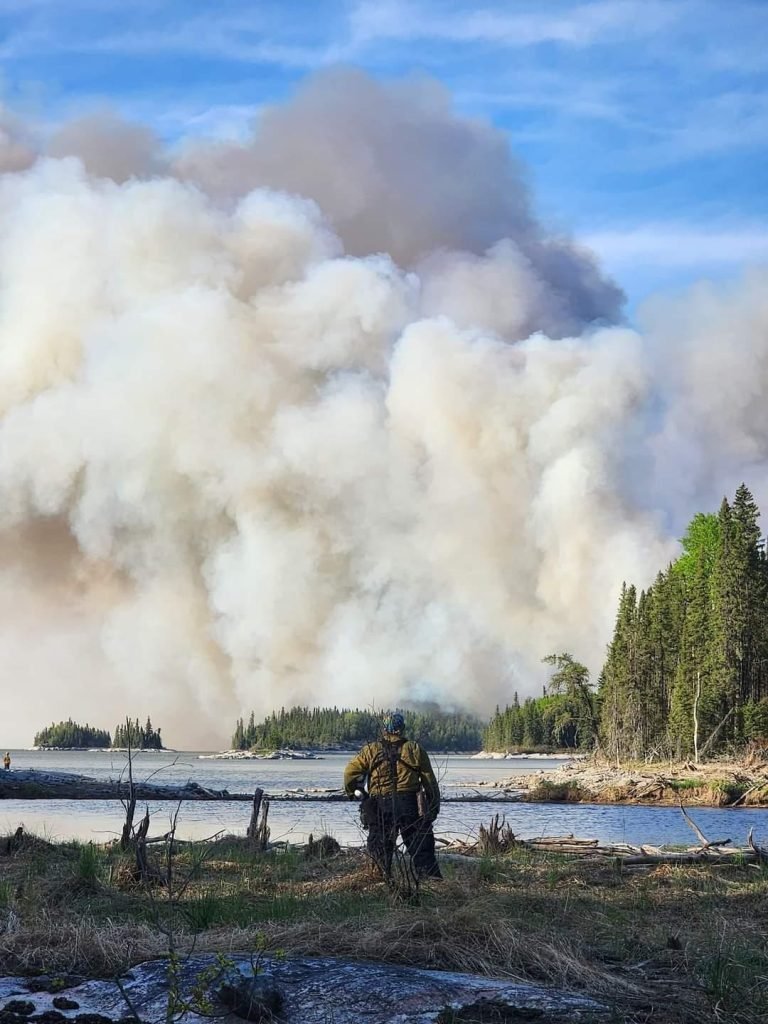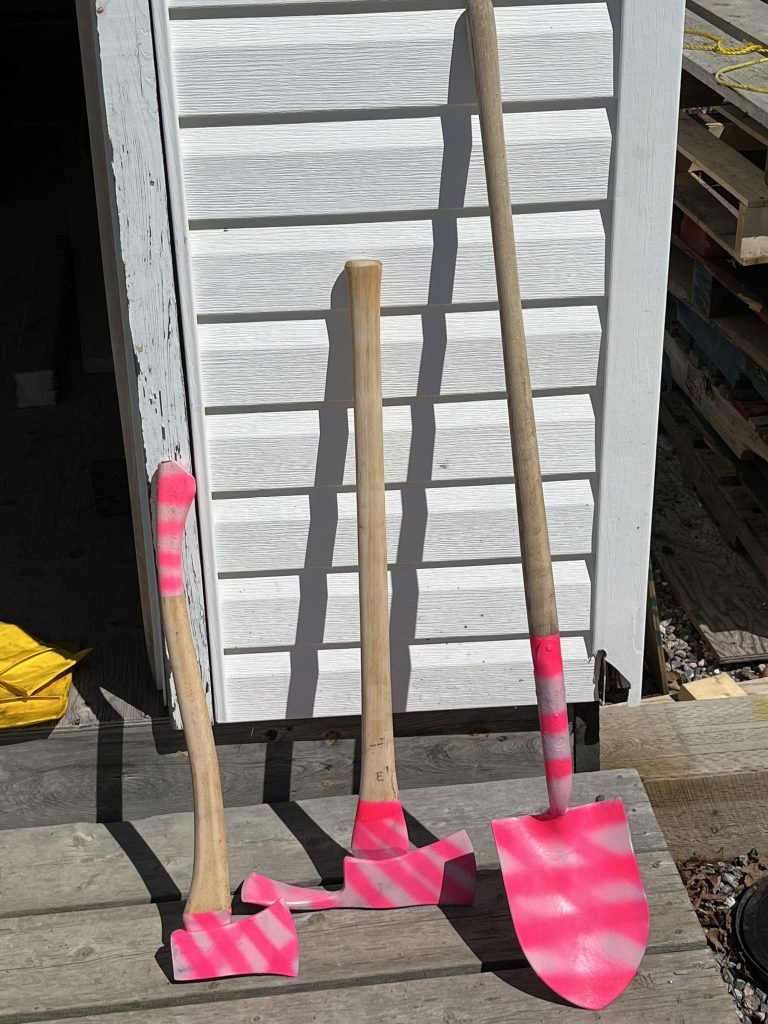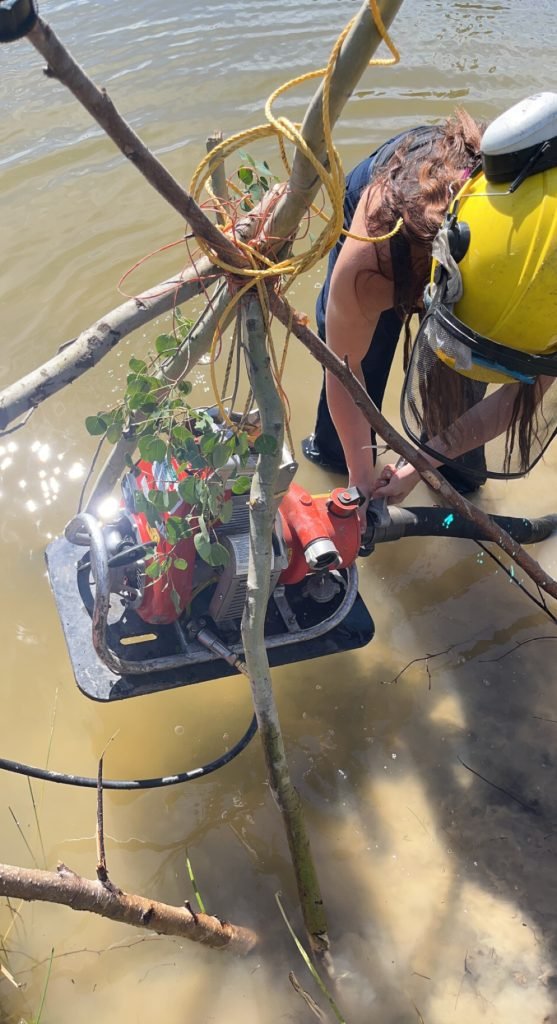‘Helitack’ crew chief from Chomedey sends back dispatches from the front

Reports of rampant forest fires across Canada have been consistently in the news all this summer. And given the role of climate change, the situation in coming years is only expected to get worse.
Chomedey resident Jacob Abramson’s son, Marc, who is also from Chomedey, is currently a “Helitack Crew Chief,” fighting fires in Manitoba. (Helitack stands for Helicopter Transport Initial Wildfire Attack.)
The men and women on the fire lines are often invisible. The difficulty of their task, the conditions under which they work, and the physical and mental discipline required cannot be fully appreciated in video images or sound bites.
A seasoned firefighter
Marc, 42, has worked as a wilderness firefighter for several years in the U.S. states of Nevada, Montana and Wyoming, as well as in Manitoba in Canada. He was most recently stationed in the Paint Lake region of North East Manitoba about 750 kilometres north of Winnipeg.

After Marc worked 23 days on various fire lines (the maximum allowed) this past summer, his father told the Laval News that Marc sat down and wrote a poem in one hour directly from his guts. Its style is reminiscent of the poetic work of another Canadian who spent a lot of time in the wilderness: Robert W. Service. Jacob later discovered it on Marc’s Facebook page.
If you go to Marc’s Facebook page, you’ll find a recent post showing a fire team waiting for a helicopter pickup chest deep in water. Another dark but colourful post is a video of Marc walking back to camp through swamp at 11:30 at night.

Canada’s record wildfires
So far this year, according to recent reporting in the New York Times, wildfires have raged across 37 million acres in nearly every Canadian province and territory, ravaging an area more than twice as large as the amount of territory in this country that burned in any other year.
Tens of thousands of people – including most of the population of the Northwest Territories capital of Yellowknife – were forced to flee their homes all at once. Smoke has also turned the air toxic in cities across North America, including New York City and as far south as Atlanta.
In an analysis issued recently, researchers with the World Weather Attribution initiative estimated that eastern Canada now has a four to five percent chance in any given year of experiencing high-fire-risk conditions as severe or worse than this year’s.
Wildfires in Quebec
In a special analysis which focused on northern Quebec, the researchers found that wildfires in June alone burned nine times as much land as in the previous decade. They estimated that a Quebec fire season with a peak intensity like this year’s was at least twice as common as it would be without global warming.
And a fire season with a cumulative severity like this year’s is seven times as common. It was estimated that more than 1,000 fires were raging across Canada in recent weeks, most of them uncontrolled.
DAY 23 (Marc’s poem)
My toenail’s turned up on itself,
My inner thighs are skinned,
My knee’s been torqued a thousand times,
My ankles’ skin is thinned.
Been pulling hose and scouting line
so many days on end.
And yet the fires refuse to die,
Just one! — Just one more bend!
My insole sheered itself in half,
I don’t know where it went.
I’m getting mad at little things,
my patience all but spent.
My clothes, they stink, direct result
of fourteen days afield.
Alike in kind, my sleeping bag,
which might make paint to peel.
I haven’t seen a shower stall
in days that feel like years.
At best I’ll get a hobo bath
to scrape the top few layers.
I’ve forgotten creature comforts,
like pillows, soap, and sheets.
I’ve been wet since 9am,
and now it’s time to sleep.
And so I’m lulled to dreams tonight,
again in field and mud,
By a symphony outside the tent
that calls out for my blood.
But I’ll not rest in peace tonight,
no soundful sleep for me.
For there’s a monster steps away
That’s eating all it sees.
The heli’ comes, “We’re going home!”
Bush crazy as a loon.
The bugs swarm worse, as if to say,
“you’re leaving us so soon.”
And now I sit here on the deck:
I’m clean, I’m healed, I’m dry.
But four days hence I’ll go again,
and never wonder why.














